《中國的民主》白皮書(雙語全文)
新華網 2021-12-07 14:21

三、具有具體現實的民主實踐
III. Concrete and Pragmatic Practices
中國發(fā)展全過程人民民主,既有完整的制度程序,也有完整的參與實踐。全過程人民民主,把選舉民主與協商民主結合起來,把民主選舉、民主協商、民主決策、民主管理、民主監(jiān)督貫通起來,涵蓋經濟、政治、文化、社會、生態(tài)文明等各個方面,關注國家發(fā)展大事、社會治理難事、百姓日常瑣事,具有時間上的連續(xù)性、內容上的整體性、運行上的協同性、人民參與上的廣泛性和持續(xù)性,使國家政治生活和社會生活各環(huán)節(jié)、各方面都體現人民意愿、聽到人民聲音,有效防止了選舉時漫天許諾、選舉后無人過問的現象。
Whole-process people's democracy in China is a complete system with supporting mechanisms and procedures, and has been fully tested through wide participation. China's whole-process people's democracy is a combination of electoral democracy and consultative democracy, and is applied through a combination of elections, consultations, decision-making, management and oversight. It covers the economic, political, cultural, social, eco-environmental and other fields, with a focus on national development, social governance and people's lives.
Whole-process people's democracy is a comprehensive and coordinated system involving extensive and regular participation, ensuring that the people's voices are heard and their wishes are represented in every aspect of China's political and social life. Whole-process people's democracy prevents individuals from manipulating the political process to win elections, and leaves no room for politicians to shower promises while campaigning and break them all once elected.
(一)民主選舉
1. Democratic Election
人民通過選舉、投票行使權利,選出代表自己意愿的人來掌握并行使權力,是中國民主的一種重要形式,是人民實現當家作主的重要體現。
By exercising their right to vote in elections, the people elect those who represent their will to hold and exercise power. This is an important form of democracy in China, and a clear demonstration of the people's status as masters of the country.
中國的選舉是廣泛的,有國家機構選舉、村(居)委會選舉、企事業(yè)單位職工代表大會選舉等,涵蓋了國家政治生活和社會生活的各個方面;中國的選舉是平等的,人民的選舉權和被選舉權得到充分保障,一人一票、票票等值;中國的選舉是真實的,不受金錢操控,選民按照自己的意愿選出自己信任的人;中國的選舉是發(fā)展的,選舉形式手段隨著經濟社會的發(fā)展不斷創(chuàng)新和豐富。
Elections in China are extensive and cover all aspects of the country's political and social life. They include elections to government institutions, villagers and urban residents committees, and employees congresses in enterprises and public institutions.
Elections in China are based on equality, and the people's right to vote and stand for election is fully guaranteed. Each person can cast one vote, and all votes are of equal value.
Elections in China are genuine and not manipulated by financial interests. Voters are free to vote for the candidates they trust.
Elections in China are progressing in a positive direction with the progress of the economy and society.
國家機構選舉。國家機構選舉是指,選舉產生全國人民代表大會和地方各級人民代表大會,由各級人大選舉產生同級國家機關領導人員。在中國,年滿18周歲、具有中華人民共和國國籍、未被依法剝奪政治權利的公民,都有選舉權和被選舉權。從全國人大到鄉(xiāng)級人大,五級人民代表大會代表均由民主選舉產生,每屆任期5年。按照普遍、平等、直接選舉和間接選舉相結合以及差額選舉、無記名投票的原則,選民直接選舉產生縣鄉(xiāng)兩級人大代表,縣級以上人大代表由下一級人大選舉產生。各級國家機關領導人員均由同級人大選舉產生或者決定任命。
Elections to state organs. These include elections to the NPC and the local people's congresses at all levels, and those in which deputies to people's congresses elect leading officials of state organs at the corresponding levels. All citizens of the PRC who have reached the age of 18 – with the exception of those persons deprived of political rights in accordance with the law – have the right to vote and stand for election.
In accordance with the principles of universal suffrage, equal rights, multiple candidates, and secret ballot, deputies to people's congresses at the township and county levels are elected directly by the public. Deputies to people's congresses at the city, provincial and national levels are elected by people's congresses at the next level below. All deputies are elected for a term of five years. Leading officials of state organs at various levels are appointed or elected by people's congresses at the corresponding levels.
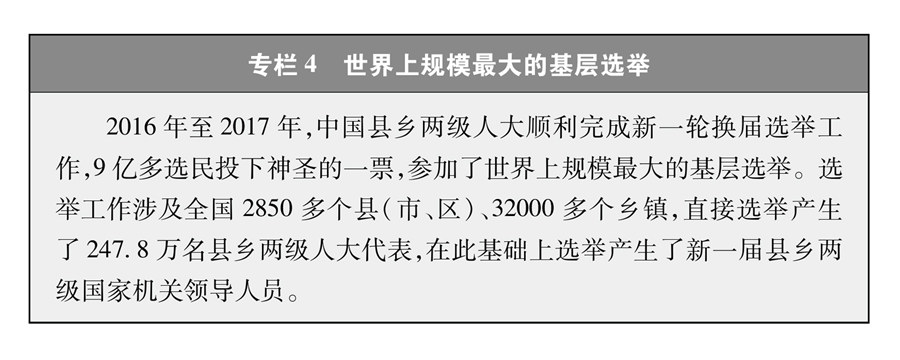
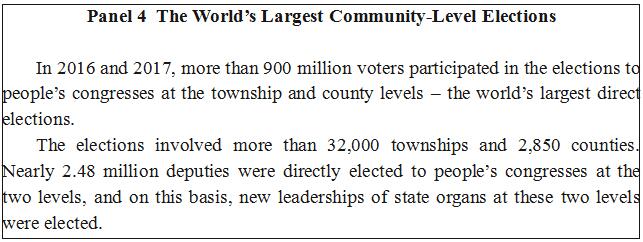
基層選舉。基層選舉是中國最廣泛、最生動的民主實踐,包括村(居)民委員會選舉和企事業(yè)單位職工代表大會選舉。村(居)民委員會由主任、副主任和委員組成,村(居)民委員會選舉與縣鄉(xiāng)人大選舉同步進行。村(居)民依法定期選舉產生村(居)民委員會成員。在企事業(yè)單位中,職工代表大會是職工當家作主、行使民主管理權力的機構,職工代表由全體職工通過民主選舉產生。
Community-level elections. Elections at the grassroots level are the most extensive and dynamic form of democracy in China. They include elections of villagers committees, urban residents committees, and employees congresses in enterprises and public institutions.
Villagers and urban residents committees are composed of chairpersons, vice chairpersons and members, and the elections are held simultaneously with those at the township and county levels.
Employees congresses – elected by all employees – are the bodies through which employees exercise their democratic management rights and make their own decisions in enterprises and public institutions.
中國的民主選舉是符合中國國情的,是與中國的發(fā)展階段相適應的,是隨著經濟社會發(fā)展與時俱進的。幾十年來,中國適時修改選舉法,選舉全國人大代表時,農村和城市每位代表所代表的人口比例從新中國成立初期的8∶1,到1995年的4∶1,再到2010年的1∶1,逐步實現了城鄉(xiāng)人口的平等選舉。人們的民主意識不斷增強,參選率不斷提高。改革開放以來,中國先后進行12次鄉(xiāng)級人大代表直接選舉、11次縣級人大代表直接選舉,選民參選率均保持在90%左右。
China's democratic elections are adapted to the country's national conditions and stage of socio-economic development. Over recent decades, theElectoral Law of the National People's Congress and Local People's Congresseshas been amended progressively. The ratio of deputy representation in people's congresses has been optimized – in 1953 there was an imbalance between urban areas and rural areas that gave urban residents eight times more representation than rural residents. By 1995 this ratio had fallen to 4:1, and by 2010 there was parity – urban and rural residents had equal levels of representation.
As the understanding of democracy has grown, so has the number of people participating in elections. Since the initiation of reform and opening up, China has held 12 direct elections to people's congresses at the township level and 11 direct elections to those at the county level, with a current participation rate of about 90 percent.
(二)民主協商
2. Democratic Consultation
有事好商量,眾人的事情由眾人商量,找到全社會意愿和要求的最大公約數,是人民民主的真諦。人民在通過選舉、投票行使權利的同時,在重大決策前和決策過程中進行充分協商,盡可能就共同性問題取得一致意見。協商民主是中國民主獨特的、獨有的、獨到的民主形式。
Whenever a problem occurs, those concerned should always hold deliberations in good faith. Matters involving many people are discussed by all those involved; to reach the greatest common ground based on the wishes and needs of the whole of society is the essence of people's democracy. The Chinese people widely exercise their right to vote in elections and undertake extensive deliberations before major decisions are made. Democratic consultation is a special feature of democracy in China.
具有深厚基礎。協商民主源自中華民族長期形成的天下為公、兼容并蓄、求同存異等優(yōu)秀政治文化,源自近代以后中國政治發(fā)展的現實進程,源自中國共產黨領導人民進行不懈奮斗的長期實踐,源自新中國成立后各黨派、各團體、各民族、各階層、各界人士在政治制度上共同實現的偉大創(chuàng)造,源自改革開放以來中國在政治體制上的不斷創(chuàng)新,具有深厚的文化基礎、理論基礎、實踐基礎、制度基礎。
Democratic consultation has been established on the basis of solid cultural, theoretical, practical and institutional foundations. It derives from the best of traditional Chinese culture, including such ideas as aspiring for the common good, mutual understanding and inclusiveness, and seeking common ground while setting aside differences.
It comes from years of tenacious struggle by the Chinese people led by the CPC.
It originates from the political system created by all parties, organizations, ethnic groups, social groups and people from all walks of life since the founding of the PRC.
It also stems from China's continuous innovation in its state institutions since reform and opening up.
形式廣泛多樣。在各領域各層級,人民群眾就改革發(fā)展穩(wěn)定的重大問題以及事關自身利益的問題,通過提案、會議、座談、論證、聽證、評估、咨詢、網絡、民意調查等多種途徑和方式,在決策之前和決策實施之中開展廣泛協商。涉及全國各族人民利益的事情,在全體人民和全社會中廣泛商量;涉及一個地方人民群眾利益的事情,在這個地方的人民群眾中廣泛商量;涉及一部分群眾利益、特定群眾利益的事情,在這部分群眾中廣泛商量;涉及基層群眾利益的事情,在基層群眾中廣泛商量。
Democratic consultation takes many forms. In making and implementing decisions on major issues concerning reform, development and stability, and on matters bearing on the vital interests of the people, China conducts extensive consultations in all fields and at levels through various channels, including proposals, conferences, discussions, seminars, hearings, assessments, consultations, the internet, and opinion polls.
On matters that have a bearing on the interests of everyone, extensive consultations will be held throughout the whole of society; on matters that concern the interests of people in one specific region, consultations will be held locally; on matters that affect the interests of certain groups of people, consultations will be held among those groups; and on matters that concern the interests of a community, consultations will be held within the community.
體系不斷健全。中國不斷完善協商民主的發(fā)展路徑,探索形成了政黨協商、人大協商、政府協商、政協協商、人民團體協商、基層協商、社會組織協商等協商渠道,推動協商民主廣泛多層制度化發(fā)展。政黨協商,是中國共產黨就中共全國代表大會和中共中央委員會的有關重要文件、憲法修改、有關重要法律的制定和修改、國家領導人建議人選、國民經濟和社會發(fā)展的中長期規(guī)劃以及年度經濟社會發(fā)展情況、關系改革發(fā)展穩(wěn)定等重要問題、統(tǒng)一戰(zhàn)線和多黨合作的重大問題等,同民主黨派開展協商;人大協商,是各級人大在依法行使職權中與有關國家機關、社會組織、專家學者、人民群眾開展協商;政府協商,是各級政府在履職盡責中與人大代表、政協委員以及民主黨派、無黨派人士、相關人民團體、社會組織以及群眾代表等加強溝通協商;政協協商,是在中國共產黨領導下,參加人民政協的各黨派團體、各族各界人士履行職能,圍繞改革發(fā)展穩(wěn)定重大問題等,在決策之前和決策實施之中廣泛協商、凝聚共識;人民團體協商,是人民團體就涉及群眾切身利益的實際問題,特別是事關特定群體權益保障的,加強與政府相關部門的協商,積極參與政協組織的協商活動;基層協商,是基層黨組織、基層政府、基層群眾性自治組織、經濟社會組織和群眾等,就基層社會發(fā)展及事關群眾切身利益的問題開展協商;社會組織協商,是各類社會組織就更好為社會服務,積極開展和參與協商。這七種協商渠道,極大豐富了民主形式、拓寬了民主渠道、加深了民主內涵。
The system of democratic consultation has improved. To promote the broad-based, multilevel and institutionalized development of consultative democracy, China has explored and expanded consultation channels to include consultations carried out by political parties, people's congresses, government departments, CPPCC committees, people's organizations, social organizations, and communities.
?The CPC and other political parties carry out consultations on major documents of the CPC National Congress and the Central Committee, the revision of the Constitution, the formulation and revision of major laws, the selection of candidates for state leaders, medium and long-term programs of socio-economic development, annual plan of socio-economic development, and major issues related to reform, development and stability, the united front, and multiparty cooperation.
?In exercising their functions and powers, people's congresses at all levels engage in deliberations with government departments, social organizations, experts and academics, and the general public.
?Governments at all levels, when performing their duties, strengthen communication with deputies to people's congresses, members of CPPCC committees, and representatives from the other political parties, the non-affiliates, people's organizations, social organizations, and all sectors of society.
?Under the leadership of the CPC, the CPPCC carries out extensive consultations and build consensus on matters concerning reform, development, and stability.
?People's organizations conduct consultations with relevant government departments on matters concerning the people's vital interests, especially those concerning the rights and interests of particular groups, and participate in consultations organized by the CPPCC.
?CPC organizations, government departments, and people's organizations for self-governance at the grassroots level, economic and social organizations, and local people deliberate over issues concerning the development of local communities and the vital interests of the people.
?Social organizations participate in or carry out consultations to better serve society.
With these seven consultation channels in place, China practices a rich and extensive form of democracy.
中國的協商民主,廣開言路,集思廣益,促進不同思想觀點的充分表達和深入交流,做到相互尊重、平等協商而不強加于人,遵循規(guī)則、有序協商而不各說各話,體諒包容、真誠協商而不偏激偏執(zhí),形成既暢所欲言、各抒己見,又理性有度、合法依章的良好協商氛圍,充分發(fā)揚了民主精神,廣泛凝聚了全社會共識,促進了社會和諧穩(wěn)定。
China draws on collective wisdom and promotes full expression and in-depth exchange of different ideas and viewpoints through democratic consultation. Parties to these consultations respect each other, consult on an equal footing, follow the rules, hold orderly discussions, stay inclusive and tolerant, and negotiate in good faith. In this way, a positive environment for consultation has been cultivated in which everyone can express their own views freely, rationally and in accordance with the law and rules. Through democratic consultation, China has built consensus and promoted social harmony and stability.
(三)民主決策
3. Democratic Decision-Making
民主決策是全過程人民民主的重要一環(huán)。好的決策,反映人民意愿,保障人民權益,增進人民福祉。在中國,察民情、聽民聲、順民意,群策群力、集思廣益成為常態(tài),越來越多來自基層的聲音直達各級決策層,越來越多的群眾意見轉化為黨和政府的重大決策。
Democratic decision-making is an important link in China's whole-process people's democracy. Reflecting the will of the people, sound decision-making ensures their rights and interests and improves their wellbeing. In China, the standard practice is to hear people's voices, act on their needs, and pool their ideas and strength. More and more ideas and suggestions of the general public are flowing directly to decision-makers at all levels, and they are increasingly reflected in the major decisions of the Party and the government.
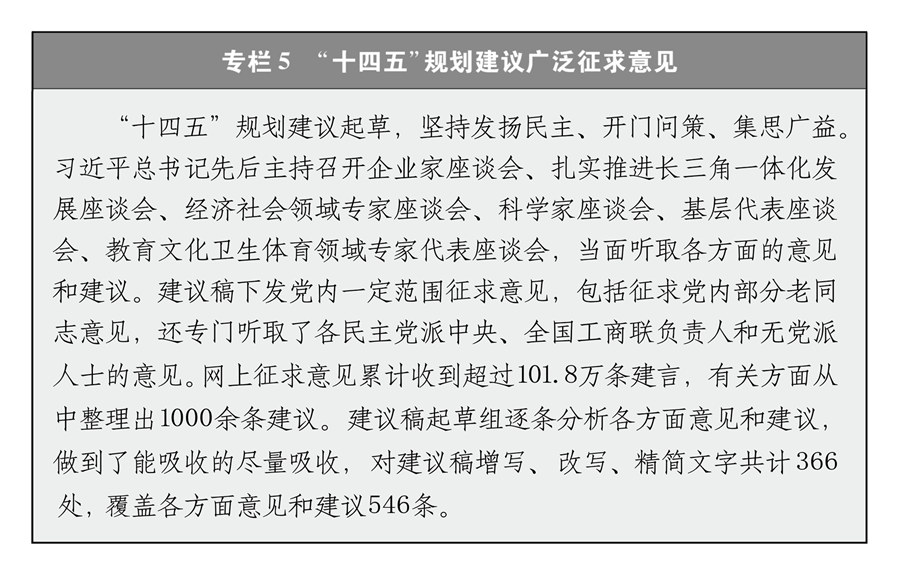
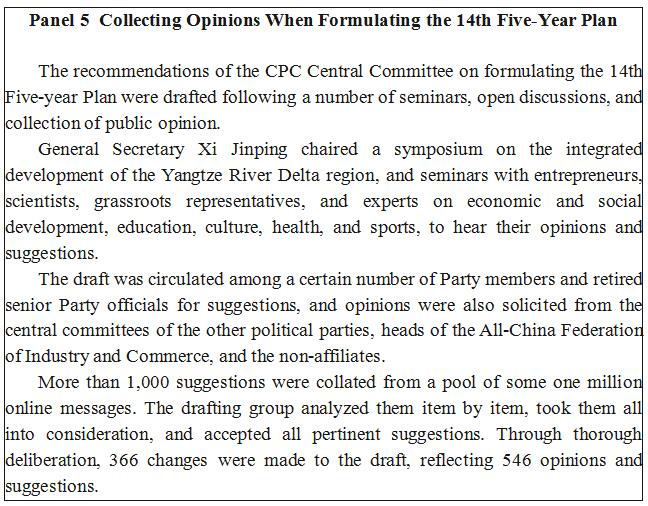
人大“開門立法”。各級人民代表大會及其常務委員會,堅持為民立法、民主立法,保障人民通過各種途徑參與立法活動,努力讓每一項立法反映人民意愿、得到人民擁護。法律立項,通過召開座談會、聽證會、論證會等方式,廣泛聽取意見,讓人民的意志在立法的最初階段就得到體現;法律草案起草,廣泛聽取公眾意見和專業(yè)人士建議,探索委托第三方起草法律法規(guī)草案,讓人民的訴求得到充分體現;法律草案公布,通過網絡和新聞媒體,向社會各界廣泛征求意見。基層群眾通過基層立法聯系點,直接參與法律草案的起草、立法調研、修改論證、立法后評估等多個環(huán)節(jié)。
Open-door legislation by the NPC. People's congresses at all levels and their standing committees are committed to democratic lawmaking in the public interest. To reflect their will in lawmaking, the people's participation in legislative activities is guaranteed through various channels, an approach that has won wide public support.
When a piece of legislation is proposed, seminars, hearings and discussions are held to widely solicit public opinion, so that the people's will is reflected from the very first stage of legislation. When a law is being drafted, professionals and the public are both consulted, and now third parties are entrusted to draft laws and regulations on a trial basis. When a draft law is released, it is subject to public review from online channels and news media. Through local legislative information offices, people can participate in the drafting, research, revision, evaluation, and post-assessment of draft laws.
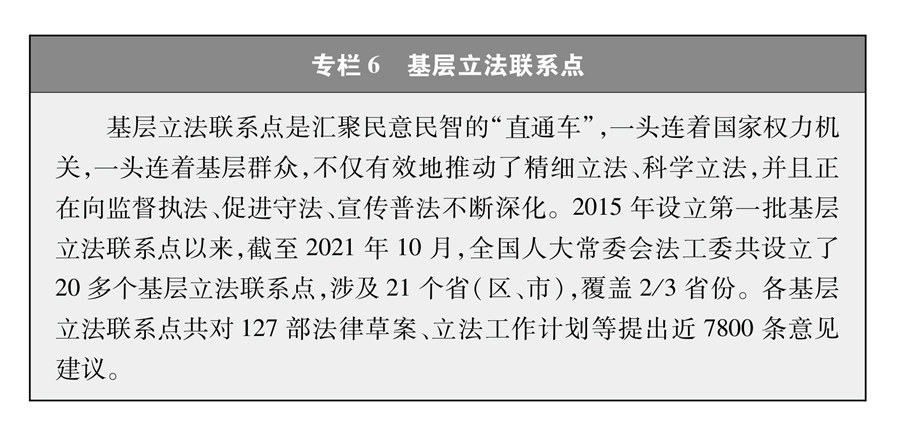
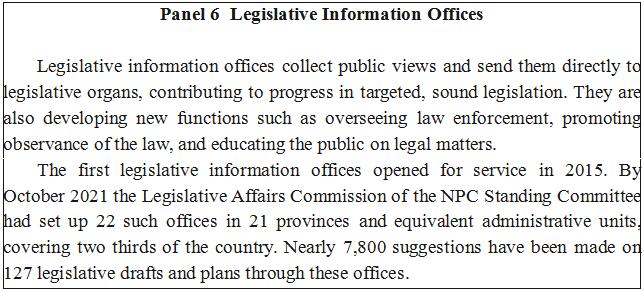
政府“開門問策”。各級人民政府就即將實施的重大決策和各方提出的重大決策建議,充分聽取各方面意見,保障人民群眾通過多種途徑和形式參與決策。在決策啟動環(huán)節(jié),人大代表、政協委員通過建議、提案等方式提出建議,公民、法人和其他組織提出書面建議,決策機關啟動決策程序;在決策研究制定環(huán)節(jié),通過座談會、公開征求意見、聽證會、問卷調查、實地走訪等方式,廣泛聽取社會各界特別是直接關系人的意見和建議;在決策草案公示環(huán)節(jié),通過政府網站和各類媒體,公布決策草案及其說明材料;在決策最終確定環(huán)節(jié),按照民主集中制原則,在集體討論的基礎上作出決定;在決策后評估階段,聽取社會公眾意見,吸收人大代表、政協委員、人民團體、基層組織、社會組織和專家等參與評估。
Transparent decision-making by the government. Governments at all levels hear the opinions and suggestions of all sectors on major decisions. Public participation in decision-making is ensured in various forms and through multiple channels.
At the beginning of the decision-making process, deputies to people's congresses and CPPCC members make suggestions and proposals, and citizens, legal persons, and other organizations can file written suggestions. During the decision-making process, opinions and suggestions are collected from all social sectors, and especially from those directly concerned, through formats including seminars, hearings, questionnaires, and field trips.
For public information, the draft decisions and relevant explanatory notes are available on government websites and media portals. In the last step, the final decision is made after group discussion based on the principle of democratic centralism. In post-assessment, public opinion is solicited once more, and deputies to people's congresses, CPPCC members, people's organizations, grassroots organizations, social organizations, and experts in various fields are invited to participate.
廣大群眾參與基層決策。基層群眾通過村(居)民會議、村(居)民代表會議、村(居)民小組會議等形式,就經濟社會發(fā)展、基礎設施建設、社會綜合治理、基層文化服務、生態(tài)環(huán)境保護、自治章程制定等基層治理中的重大問題提出意見建議,參與決策制定和實施。
Grassroots decision-making. This happens in various forms of meeting among rural villagers and urban residents or their representatives, on a wide range of subjects such as the economy and society, infrastructure, social management, cultural services, eco-environmental conservation, the formulation of self-governance regulations, and other key matters in local governance. Rural villagers and urban residents also take part in carrying out the decisions they have reached.
(四)民主管理
4. Democratic Management
人民的事人民管,人民的事人民辦。在中國,廣大人民弘揚主人翁精神,發(fā)揮主體作用,積極行使民主權利,通過各種途徑和形式,管理國家事務,管理經濟和文化事業(yè),管理社會事務。
In China, the people manage their own affairs. They are the masters of the country and exercise their democratic rights accordingly, managing affairs of the state, the economy, culture, and society through various channels and in many forms.
參與國家政治生活和社會生活的管理。人民行使憲法賦予的各項權利并承擔憲法賦予公民的責任和義務,積極主動參加選舉、協商、決策、監(jiān)督等,在各個層級、各個領域參與國家政治生活和社會生活的管理,知情權、參與權、表達權、監(jiān)督權得到有力保障。
Participation in the management of political and social life. The people exercise their rights and fulfill their obligations as prescribed by the Constitution. They participate in elections, consultations, decision-making, and oversight, and manage other areas of political and social life, fully enjoying their rights of information, participation, expression, and scrutiny.
城鄉(xiāng)社區(qū)民主管理。根據憲法法律和有關規(guī)定,農村和城市社區(qū)居民結合本地實際,由村(居)民討論制定村(居)民自治章程、村規(guī)民約、居民公約等,明確規(guī)定村(居)民的權利和義務,村(社區(qū))各類組織之間的關系和工作程序,以及經濟管理、社會治安、消防安全、環(huán)境衛(wèi)生、婚姻家庭、鄰里關系、計劃生育、精神文明建設等方面的自治要求,普遍實現村(居)民在基層公共事務和公益事業(yè)中的自我管理、自我服務、自我教育、自我監(jiān)督。
Democratic management of urban and rural communities. As per the Constitution, relevant laws and regulations, urban and rural residents can set rules and conventions to govern their communities. Through discussion, they can decide residents' rights and obligations, the coordination rules and procedures between local organizations, and general principles for the collective economy, neighborhood security, fire safety, community sanitation, marriage, neighborhood relations, family planning, and activities concerning cultural progress. All urban and rural communities are run by their residents, who manage the public affairs and public services in their communities, exercise self-supervision, and seek to improve their lives.
企事業(yè)單位民主管理。全國超過1.5億市場主體自主經營、自我管理、活力迸發(fā),承載7億多人就業(yè),推動了中國經濟總量、國家財力和社會財富穩(wěn)定增長。根據憲法法律和有關規(guī)定,企事業(yè)單位普遍建立以職工代表大會為基本形式,以廠務公開制度、職工董事制度、職工監(jiān)事制度為主要內容的民主管理制度。職工通過這些民主管理制度,參與企事業(yè)單位管理,維護單位職工合法權益,實現單位與職工協商共事、機制共建、效益共創(chuàng)、利益共享。目前,全國已建工會企業(yè)中,建立職工代表大會的企業(yè)有314.4萬家,其中,非公有制企業(yè)293.8萬家、占93.4%。
Democratic management of enterprises and public institutions. With autonomy in their business operations and management, more than 150 million market entities are thriving across the country, providing job opportunities to over 700 million people, increasing China's national strength and promoting steady growth in economic and social wealth.
In accordance with the Constitution, relevant laws and regulations, enterprises and public institutions are run under democratic management through their employees congresses. The framework features disclosure of information on the affairs of enterprises, and systems for employees to serve on the board of directors and the board of supervisors. Under this framework, employees participate in business management, and protect their own legitimate rights and interests. In this way enterprises and their employees develop and maintain management mechanisms through consultation, and share the benefits they create.
A total of 3.14 million enterprises have established employees congresses, including 2.94 million private enterprises.
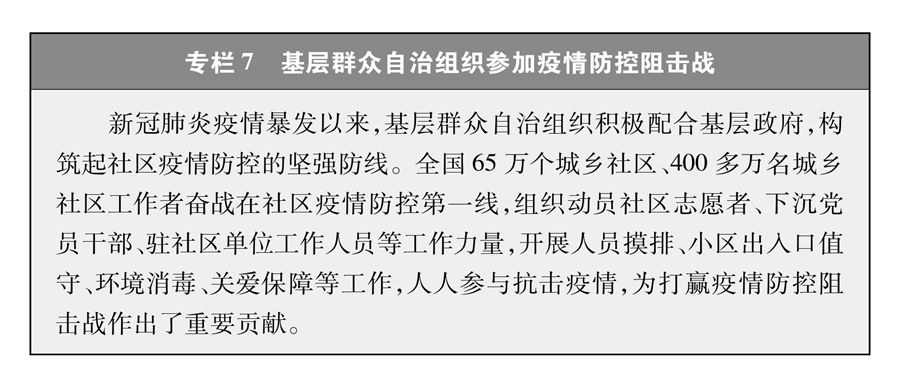
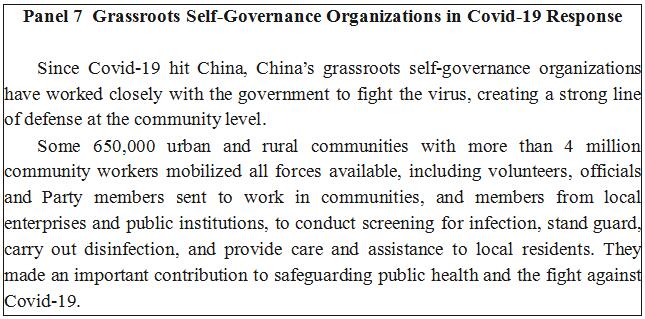
社會組織民主管理。社會團體、基金會、社會服務機構等社會組織,普遍制定章程,加強組織成員管理,自主開展活動,集中組織成員或服務對象的意見建議,以組織化的方式積極參與社會公共事務治理,在行業(yè)自律、社會服務、慈善事業(yè)等領域發(fā)揮民主管理作用。截至2021年11月,各級民政部門共登記社會組織超過90萬家,其中全國性社會組織2284家。形式多樣的社會組織成為人民民主管理的重要領域。
Democratic management of social organizations. Associations, foundations, social services and other social organizations formulate their own charters and exercise autonomy in managing their staff and activities. They address the concerns of their staff and clients, and hear their opinions. They participate in the governance of public affairs as appropriate to their role, and contribute to improving professional discipline, public services and charitable undertakings.
As of November 2021, more than 900,000 social organizations were registered with departments of civil affairs at all levels, including 2,284 with national networks. Diverse in form, social organizations have become an important area of people's democratic management in China.
(五)民主監(jiān)督
5. Democratic Oversight
全面有效的民主監(jiān)督,保證人民的民主權利不因選舉結束而中斷,保證權力運用得到有效制約。在中國,解決權力濫用、以權謀私的問題,不能靠所謂的政黨輪替和三權分立,要靠科學有效的民主監(jiān)督。中國結合本國實際,探索構建起一套有機貫通、相互協調的監(jiān)督體系,形成了配置科學、權責協同、運行高效的監(jiān)督網,對權力的監(jiān)督逐步延伸到每個領域、每個角落。
Comprehensive and effective democratic oversight enables the people to continue to exercise their democratic rights after elections, and ensures that there is an effective check on the exercise of power. In China, the abuse of power for personal gain is not eradicated by the rotation of ruling parties or separation of powers, but by sound, effective democratic oversight. Taking into consideration its own conditions, China has explored a coordinated system of oversight and established a well-defined, efficient supervisory network with clear functions and responsibilities. Supervision of power extends across every area and into every corner.
人大監(jiān)督。人民代表大會充分發(fā)揮作用,對憲法法律的實施、重大決策部署的落實等開展監(jiān)督。各級人大及其常委會加強對“一府一委兩院”執(zhí)法、監(jiān)察、司法工作的監(jiān)督,確保法律法規(guī)得到有效實施,確保行政權、監(jiān)察權、審判權、檢察權得到正確行使。人民通過人大代表座談會、基層群眾座談會、問卷調查、網絡調研等“開門監(jiān)督”的形式,積極參與人大監(jiān)督工作。
Supervision by people's congresses. People's congresses play their full role in overseeing the enforcement of the Constitution and laws, and the implementation of major decisions and plans. The people's congresses at all levels and their standing committees have strengthened their efforts to oversee judicial, supervisory and law enforcement work by the government, supervisory commissions, people's courts, and people's procuratorates, to ensure that laws and regulations are observed and that administrative, supervisory, judicial and procuratorial powers are exercised properly. The people actively participate in supervisory work of the people's congresses by various means such as forums of NPC deputies, meetings of people from the grassroots, questionnaires, online research, etc.
民主監(jiān)督。中國共產黨支持民主黨派和無黨派人士在堅持四項基本原則基礎上,在政治協商、調研考察,參與黨和國家有關重大方針政策、決策部署執(zhí)行和實施情況的監(jiān)督檢查,受黨委委托就有關重大問題進行專項監(jiān)督等工作中,通過提出意見、批評、建議等方式,進行民主監(jiān)督。參加人民政協的各黨派團體和各族各界人士在政協組織的各種活動中,依據政協章程,重點就黨和國家重大方針政策和重要決策部署的貫徹落實情況,以提出意見、批評、建議的方式進行協商式監(jiān)督,協助黨和政府解決問題、改進工作、增進團結、凝心聚力。
Supervision by non-CPC political parties. The CPC encourages the other political parties and the non-affiliates to exercise democratic oversight by expressing views, making criticism and giving advice as they participate in political consultation, conduct field work, take part in inspection and oversight of the implementation of major policies, decisions and plans of the Party and the state, and carry out targeted scrutiny over major issues as entrusted by CPC committees, while adhering to the Four Cardinal Principles – to keep to the path of socialism, to uphold the people's democratic dictatorship, to uphold the leadership of the CPC, and to uphold Marxism-Leninism and Mao Zedong Thought. The political parties, organizations, and prominent figures participating in the CPPCC can, in accordance with the CPPCC's charter, oversee in various activities organized by the CPPCC the implementation of major policies, decisions and plans of the CPC and the state by offering criticisms and suggestions. Their assistance to the CPC and the government in solving problems and improving their work increases solidarity.
行政監(jiān)督。國家行政機關按照法定的權限、程序和方式,對行政機關自身的組織行為、行政行為進行監(jiān)督,包括各行政機關自上而下、自下而上以及相互之間進行的監(jiān)督。
Administrative supervision. The state administrative organs, in accordance with their statutory authority, procedures and methods, supervise their own operational and administrative acts. Different organs supervise each other, and conduct internal supervision from top to bottom and from bottom to top.
監(jiān)察監(jiān)督。監(jiān)察機關依法履行監(jiān)察監(jiān)督職責,對公職人員政治品行、行使公權力和道德操守情況進行監(jiān)督檢查,督促有關機關、單位加強對所屬公職人員的教育、管理、監(jiān)督。
Oversight by supervisory commissions. Supervisory commissions perform their duties of supervision as provided for by the law. They examine the political conduct of public servants and supervise their exercise of public power and their fulfillment of professional ethics; they can also urge relevant organs and units to strengthen education, management and supervision of their staff.
司法監(jiān)督。審判機關和檢察機關依照法定職權和程序對人民授權的國家公權力進行監(jiān)督。司法監(jiān)督是黨和國家監(jiān)督體系中強制性程度最高的一種監(jiān)督機制,是黨和國家利用監(jiān)督手段、維護公權力正確行使的“最后一道防線”。
Judicial supervision. The judicial and procuratorial organs, in accordance with their statutory purview and procedures, supervise the exercise of public power mandated by the people. Judicial supervision is the most forceful form of oversight of the CPC and the state; it is the ultimate "line of defense" to ensure lawful exercise of public power.
審計監(jiān)督。審計機關依法對本級各部門和下級政府預算的執(zhí)行情況和決算以及其他財政收支情況,進行審計監(jiān)督。
Auditing supervision. Auditing organs at each level inspect budget performance, audit the final accounts and the revenues and expenditures of the departments at their level and of lower-level governments.
財會監(jiān)督。財政部門根據法律授權,對財政、財務、會計管理的法律、行政法規(guī)、部門規(guī)章等執(zhí)行情況進行監(jiān)督。
Fiscal and accounting supervision. Financial departments are legally empowered to supervise the enforcement of laws, administrative regulations, and departmental regulations that govern fiscal and accounting affairs.
統(tǒng)計監(jiān)督。統(tǒng)計部門及負有統(tǒng)計調查職責的相關機關,對所有行使統(tǒng)計權力、負有統(tǒng)計義務的組織和人員進行監(jiān)督,防范和懲治統(tǒng)計造假、弄虛作假,確保統(tǒng)計資料真實準確、完整及時,為經濟社會發(fā)展提供扎實的統(tǒng)計保障。
Statistical supervision. Statistical departments and relevant offices with statistical functions and duties supervise all organizations and personnel producing official statistics, to prevent and punish falsification, and ensure that statistical data are authentic, accurate, complete, and up to date, providing reliable reference for planning economic and social development.
群眾監(jiān)督。公民、法人或者其他組織通過各種方式,對各級國家機關及其組成人員履職情況進行監(jiān)督,既可以依法申請行政復議、提起行政訴訟,也有權向監(jiān)察機關檢舉控告監(jiān)察對象不依法履職,違反秉公用權、廉潔從政從業(yè)以及道德操守等規(guī)定,涉嫌職務違法、職務犯罪行為。
Public supervision. Citizens, legal persons and other organizations supervise the performance of state organs and their staff. They can request administrative review, initiate administrative litigation, or file complaints or charges with supervisory organs against any misconduct or crime involving dereliction of duty, abuse of power, or violation of professional ethics.
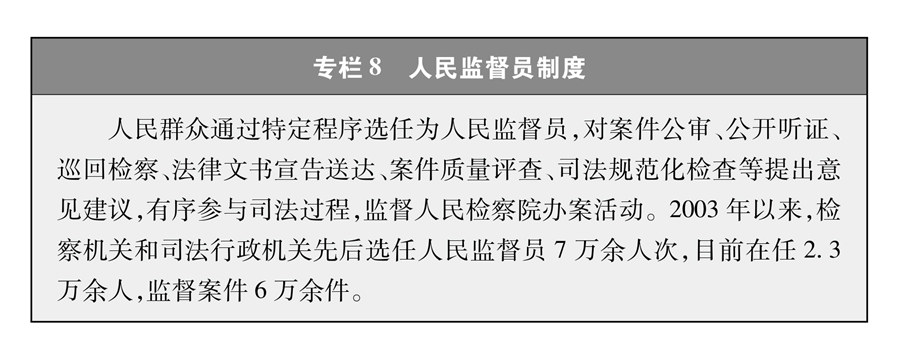
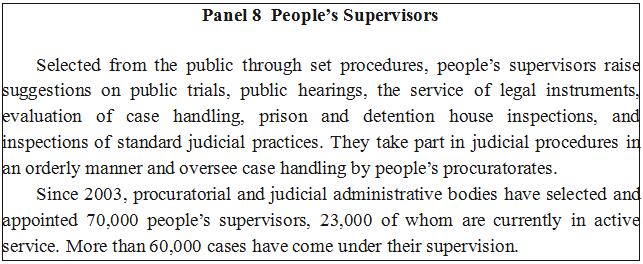
輿論監(jiān)督。媒體充分發(fā)揮輿論監(jiān)督作用,對濫用公權、失職瀆職等行為及時揭露曝光。隨著互聯網的快速發(fā)展,人們更多地借助網絡等平臺,對各級國家機關和公職人員提出意見、建議和批評,網絡在輿論監(jiān)督中發(fā)揮著越來越重要的作用。
Supervision by public opinion. The media fulfill their supervisory role by representing public opinion, exposing in a timely manner abuses of public power, derelictions of duty, and acts of malfeasance. People are now relying more on the fast-growing internet and other platforms to offer criticisms and suggestions on the work of state organs and public servants at all levels. The internet is playing a bigger part in facilitating supervision by public opinion.









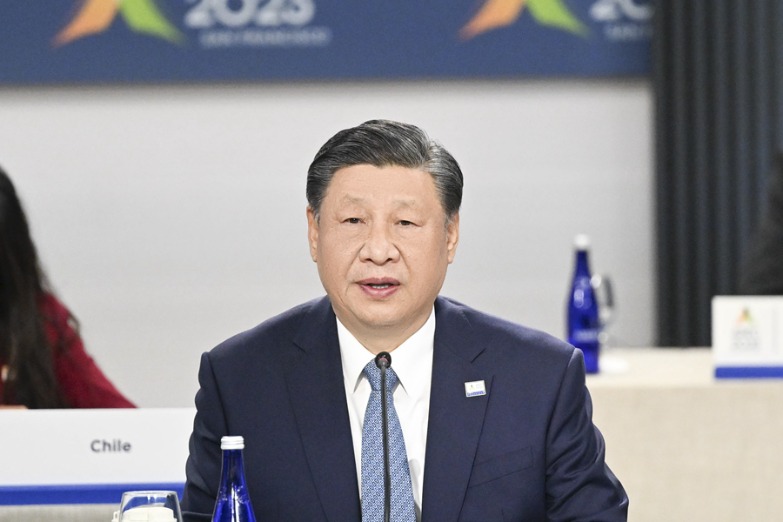
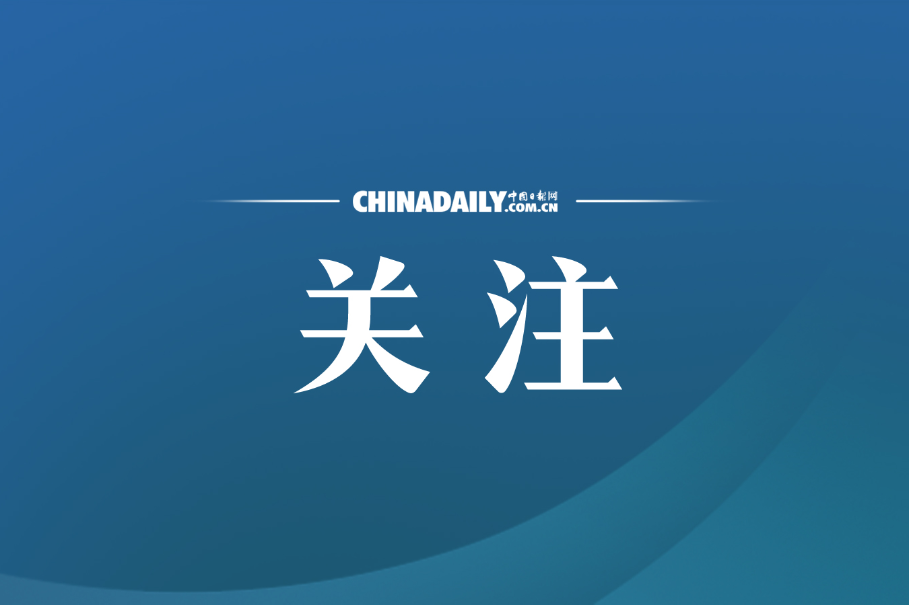
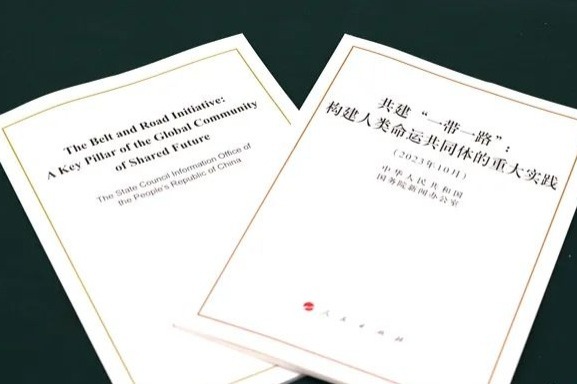
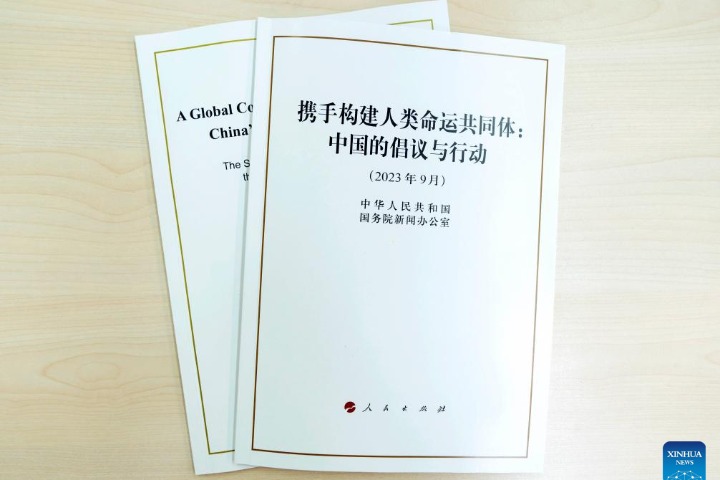
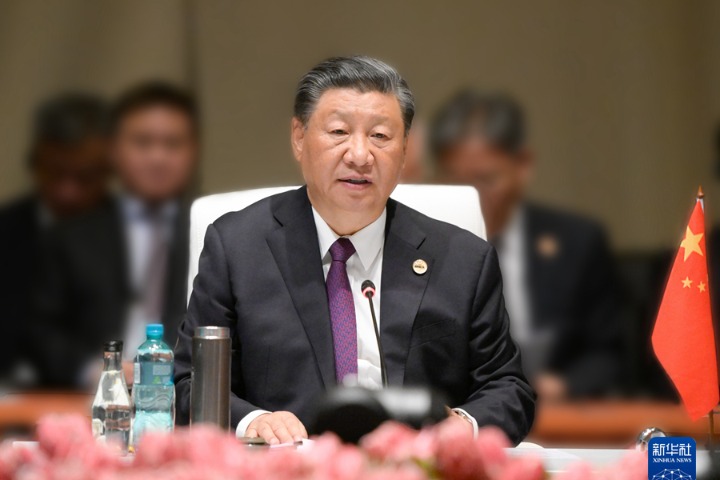



 英語點津微信
英語點津微信 雙語小程序
雙語小程序